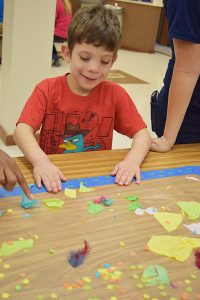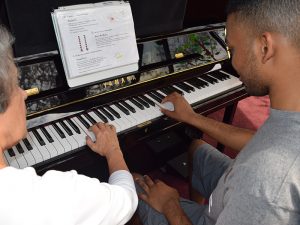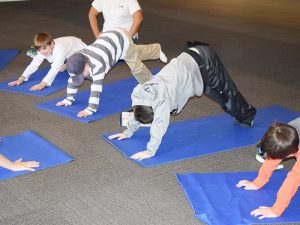Enrichment Programs
At JSA, we utilize our collaborative team effort (Individual Education Plans, Therapy Plans, Sensory Diets, and quarterly assessments of each student) to continuously provide opportunities for each student to learn through visual arts, music, karate, and yoga.
Each student will have an efficient and intentional schedule that consists of utilizing all aspects of our Enrichment Program to further enhance their academic and behavioral progress. Each student will utilize the art room and participate in various art projects at least once a week, have a private music lesson once a week, participate in group yoga classes once a week, and participate in group karate classes once a week.
Many experts agree that these types of therapy are an invaluable tool for helping the developmental process of an autistic child. We have seen this firsthand through our Enrichment Programs. However, our enrichment programs are only as successful as our fundraising efforts, as they are based on funding and are not guaranteed.
Benefits of Art

- People with autism are often highly visual thinkers, and many report that they “think in pictures”. Expressing feelings and ideas through images is very natural for such people and can be a welcome relief from the daily struggle to use words effectively.
- Art can be a wonderful facilitator in forming connections with peers. Cooperation, turn-taking, respecting differences and other social skills can all be practiced in an enjoyable, natural setting. Working together on group projects fosters cooperation, teamwork and a sense of acceptance.
- Art is ideally suited for addressing sensory processing disorder (SPD), a pervasive problem in autism which contributes to a great deal of difficult emotions and behaviors, yet is too often overlooked. When overstimulated, people with autism may become agitated, avoidant or simply “shut down” and become impassive in order to escape the unpleasant stimulus. Art can increase tolerance for unpleasant stimuli, while channeling self-stimulating behavior into more creative activity.
Benefits of Piano

- Children with autism tend to have an impaired capacity to converse, learn efficiently, social connectivity as well as the development and acquisition of new skills. Music has a complex yet predictable structure and therefore can help with all these deficiencies.
- This predictable repetition provides a great learning tool for autistic children. It has also been shown to greatly improve an autistic child’s social skills as well as patience and tolerance.
- Music can help determine the strengths of an autistic child and can also be helpful with exposing identifiable weaknesses.
- Studies have shown children with autism have an increased ability to discern pitch from other children, making listening to music a more interactive experience.
Benefits of Yoga

- Motor skills. Yoga tones muscles, enhances balance and stability, and develops body awareness and coordination.
- Confidence and social skills. Through the coordination and self-calming techniques of yoga, children are likely to grow confidence in interacting with other children and refine their social skills.
- Sensory integration. Yoga’s natural setting of dim lights, soft music, smooth mats, and “inside” voices creates a comforting environment. Yoga’s physical poses allow nervous energy to be released from the body in a controlled manner.
- Coping techniques. Whether teaching breathing techniques for self-calming or talking through a guided visualization, yoga provides an awesome toolbox for families to use at home.
- Self-awareness. Yoga is instrumental for learning self-regulation and provides a strong coping skill as students become aware of their bodies and their breathing.
- Emotional engagement. The combination of movement, music, breath work and storytelling activates the brain’s emotional region and encourages the development emotional awareness.
